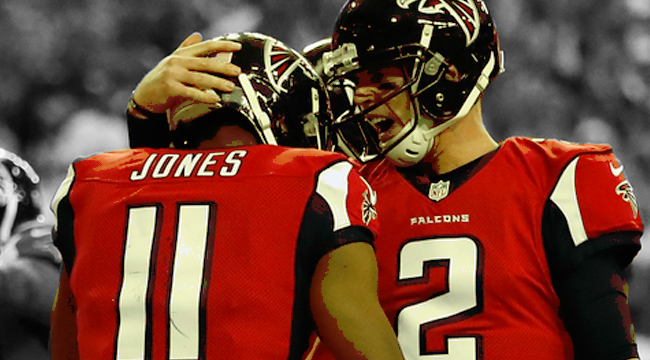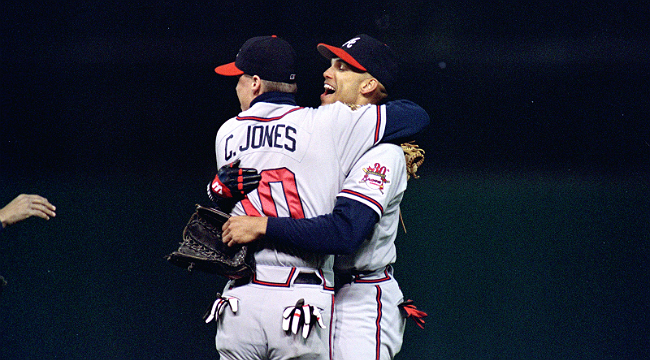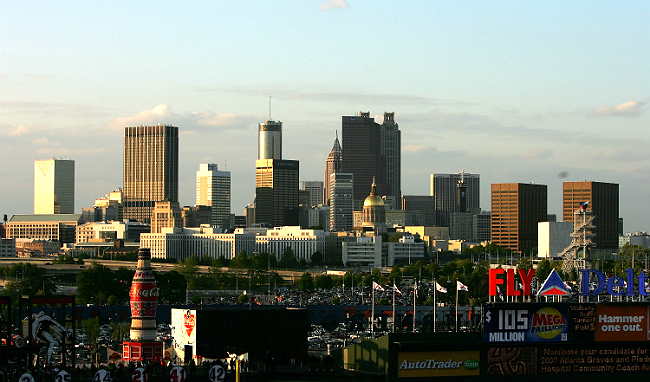
Atlanta is a perfectly fine sports town.
That’s all I want you to get out of this. As someone born in the metro Atlanta area where I have lived my whole life, I’m not here to convince you that Atlanta fans are actually the best fans in the world and everything you’ve heard is wrong. They are not. I’m not here to convince you this is a top-10 sports town in the country (I guess it could be, but probably not). I’m just here to tell you that Atlanta is a place where people really enjoy sports and will turn out to support an entertaining team. You know, like most places.
The foundation of the Atlanta sports issue is that Atlanta has very rarely had winners. Since 1966 when the Falcons and Braves arrived in the city (with the Hawks joining shortly thereafter in 1968), Atlanta’s three main professional sports teams (RIP Flames and Thrashers) have made the playoffs 43 percent of the time and have reached the conference (or league) finals (or championship) only 10 percent of the time. More than half of those trips to league championships came in one 11-year run by the Braves from 1991 to 2001 when they went nine times.
Let’s talk about those Braves for a second. Anyone that, like me, was born in the Atlanta area from 1980 to 1995 spent at least a significant amount of their childhood or teenage years with a team that was not just going to the playoffs every year but making runs deep into the playoffs every year. This was the norm to the young Atlanta fan who didn’t know the playoffs weren’t simply a guarantee.

This creates a problem for other teams. The playoffs no longer become an accomplishment worthy of celebration, as they probably should be when considering the full history of Atlanta sports. That means a team like the Hawks, which makes the playoffs every year, needs more than just a capable playoff team year in and year out to get people into Philips Arena. That means the Braves, the catalyst of this recent playoff apathy, will struggle to get people excited about a middling team scrapping for a wild card spot.
Atlanta is not a place where people are going to pack an arena or stadium 41-81 times a season. They will show up for important games and big opponents (sometimes in support of the opponent), but it’s not a massive, ravenous fan base that just can’t get enough of the home team no matter the opponent or time or mid-season lull. That’s not Atlanta, and that’s not a lot of places.
There are three main excuses for Atlanta fans not showing up regularly. The first and most notable reason, is that Atlanta the city and Atlanta the metropolitan area are two very different things. Atlanta proper is actually quite small, with a population of 420,000 in 2010, while the metropolitan area around the city had a population of 5.2 million in 2010. Atlanta is a sprawling metroplex and not one easily traversed, as public transportation is a struggle.
Getting from anywhere in the metro area to another part of the metro area in the late afternoon and early evening requires a significant amount of effort and commitment. I say metro to metro because things won’t get significantly better for Braves fans attempting to get to the new stadium in Cobb County compared to Turner Field, but, hey, the Braves moved to a significantly whiter part of town (Cobb County is 62.2 percent white, Fulton County is 44.5 percent white) and got taxpayers to foot the bill for a brand new stadium, so they’re happy.

The second reason, and one that is most often used to point out that Atlanta’s fan base is lacking, is that Atlanta is a transient city. You’ll hear this a lot, and while it’s not wrong, it’s often overused. Yes, a large majority of older people that live in Atlanta now were not born in the area and their affiliations don’t lie with Atlanta professional sports teams. However, as Hawks CEO Steve Koonin notes, the children of those people, the young adults of the city, are Atlanta natives, and that is the audience teams should be targeting to combat the issues of a transient city.
The final reason, and one tied to the above issue, is that Atlanta teams have been fairly boring. This isn’t a city built on a blue-collar tradition like some northern cities. It’s not a place that admires grit and determination over flash. Atlanta is a city that loves its entertainment and the flashier the better. That’s evident in the music that comes out of the city (as well as the city’s nightlife). To appeal to the young Atlantan, you need more than just success. You need to entertain.
Sports teams are competing with all of the other entertainment options in Atlanta for attention. Because there aren’t deep roots of success to keep fans coming back, year after year, the way there are in other places, teams have to build that connection by being fun and entertaining. Getting back to the issue of the Braves ruining a steady winner, being entertaining in Atlanta is arguably more valuable than being successful.
There is one team that has been immune to those issues recently, though, and that is the Atlanta Falcons. Since 2007, and I use this line of demarcation for a reason we’ll get to in a moment, the Falcons have drawn at least 68,000 people on average (or 96 percent attendance) in eight of those 10 seasons.
Part of the reason for the Falcons being the exception to the rule is that Atlantans love football. Whether the NFL or college, this is a place that loves football. It also has to do with Atlantans being able to carve out eight Sundays (with maybe a Monday or Thursday night tossed in) from their schedule to ride down to the Georgia Dome (RIP). It’s far easier to get out and support the home team once a week than it is to fight traffic to weeknight basketball or baseball games.
There is also the issue of entertainment, and that story starts in 2001. The Falcons didn’t fill the Georgia Dome to capacity for years. Even in the 1998 Super Bowl season, the Falcons drew the ninth smallest home attendance in the NFL — attendance rose significantly towards the end of the season once people realized they were good. This is the best example of how teams winning in Atlanta is important, but capturing the hearts of Atlanta fans for a sustained period of time requires bringing in that entertainment factor.
Enter Mike Vick.
In 2000, the Falcons had the second-worst home attendance in the NFL. In 2001, they drafted Vick first-overall and by the end of the season, with Vick as the starter, Atlanta was drawing in the top half of the league. In 2002, the Falcons home attendance number for the season jumped 125,000. There wasn’t a stadium renovation that increased capacity, it was just Vick-mania had taken over the city. From 2002 to 2006, the Falcons were never worse than 11th in the NFL in total home attendance and were never shy of 98 percent capacity for a season.
The Falcons went to the playoffs twice in five seasons with Vick at the helm. They weren’t winning at a historic rate or anything. The Falcons were simply the most exciting show in town every Sunday, so people made the pilgrimage to the Georgia Dome to watch. That was the team that captured the hearts of Atlantans young and old, and made people care about the Falcons. That love, built on the foundation of the league’s most exciting player combined with an already existing appetite for football, is why fans continue to flock to the Dome to watch the Falcons play.
People often say Atlanta needs a winner, and that’s not wrong. Atlanta fans will absolutely turn out for a team that has a chance to compete for a title, but the moment that team slips back into mediocrity or slightly above, that buzz dissipates. Atlanta, more than a winner, needs entertainment.
This year’s Falcons team is the perfect combination of the two. A team that’s winning at a level rarely seen in Atlanta sports, but it’s also a highly entertaining team. Matt Ryan has been maligned at times for not being an exciting quarterback, as he was the first franchise quarterback in Atlanta since Vick, but this year his always solid numbers have taken a jump to MVP caliber totals. Julio Jones is a monster at wide receiver, capable of thrilling big plays at any time.
This year’s Falcons is the perfect team to galvanize the city’s fan base. They win, but more importantly they entertain while doing it. And that’s all Atlanta sports fans have ever asked for.






